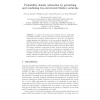Free Online Productivity Tools
i2Speak
i2Symbol
i2OCR
iTex2Img
iWeb2Print
iWeb2Shot
i2Type
iPdf2Split
iPdf2Merge
i2Bopomofo
i2Arabic
i2Style
i2Image
i2PDF
iLatex2Rtf
Sci2ools
116
click to vote
ECSQARU
2009
Springer
2009
Springer
Probability Density Estimation by Perturbing and Combining Tree Structured Markov Networks
To explore the Perturb and Combine idea for estimating probability densities, we study mixtures of tree structured Markov networks derived by bagging combined with the Chow and Liu maximum weight spanning tree algorithm, or by pure random sampling. We empirically assess the performances of these methods in terms of accuracy, with respect to mixture models derived by EM-based learning of Naive Bayes models, and EM-based learning of mixtures of trees. We find that the bagged ensembles outperform all other methods while the random ones perform also very well. Since the computational complexity of the former is quadratic and that of the latter is linear in the number of variables of interest, this paves the way towards the design of efficient density estimation methods that may be applied to problems with very large numbers of variables and comparatively very small sample sizes.
Artificial Intelligence | ECSQARU 2009 | EM-based Learning | Pure Random Sampling | Tree Structured Markov |
Related Content
| Added | 26 May 2010 |
| Updated | 26 May 2010 |
| Type | Conference |
| Year | 2009 |
| Where | ECSQARU |
| Authors | Sourour Ammar, Philippe Leray, Boris Defourny, Louis Wehenkel |
Comments (0)

